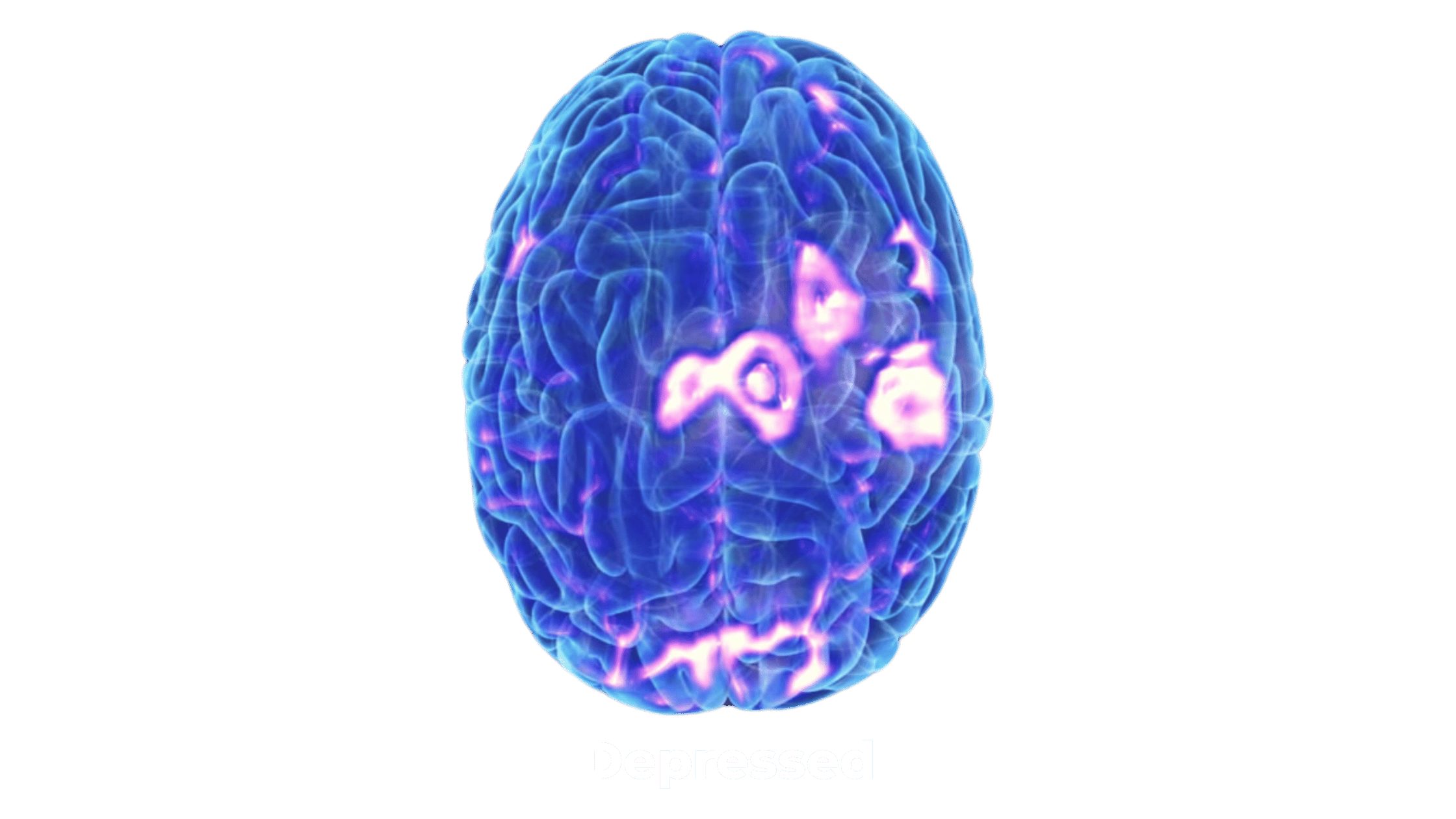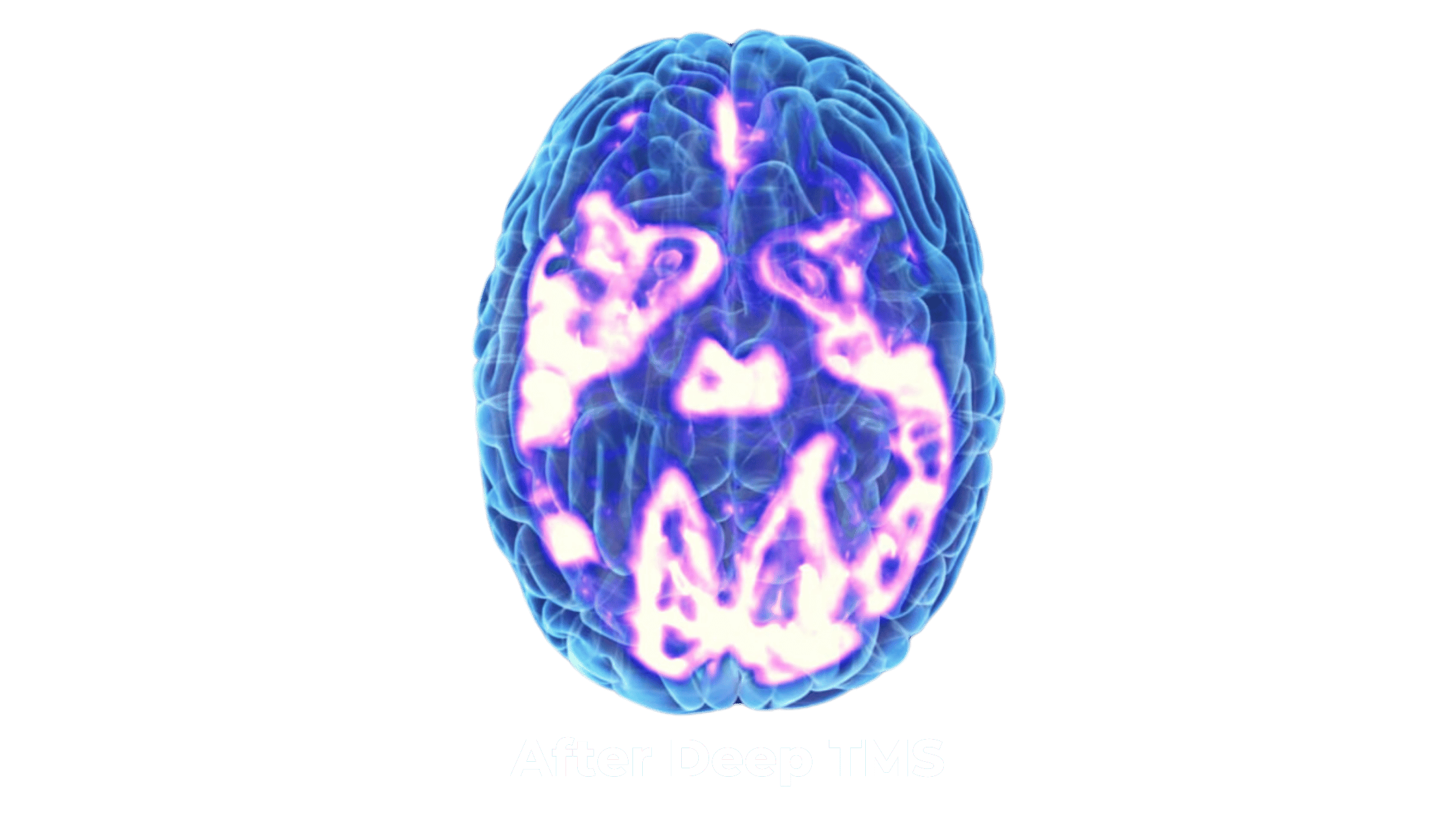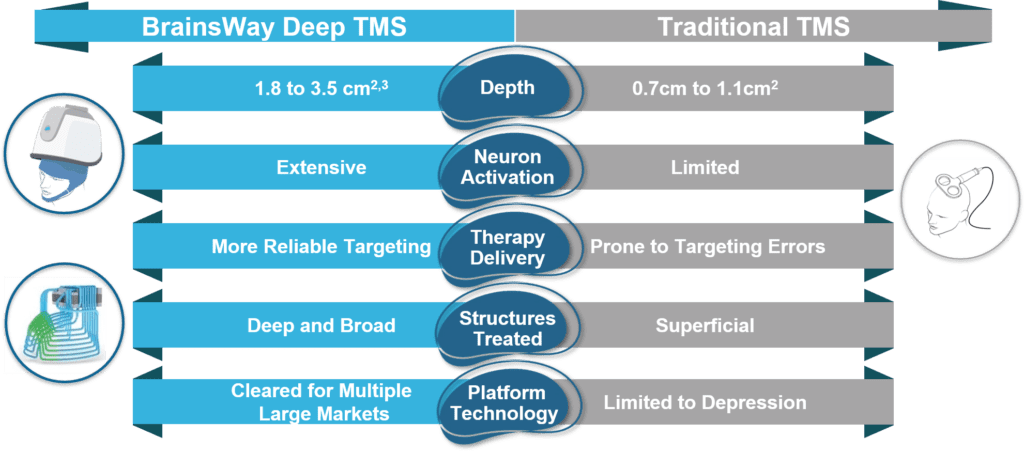Deep TMS vs TMS Therapy
Transcranial Magnetic Stimulation (TMS) is a non-invasive brain stimulation method that uses magnetic fields to activate specific neurons in the brain. Get Started
What Is TMS Therapy?
TMS therapy has been widely used to treat conditions such as depression, anxiety, and OCD by targeting underactive areas of the brain related to mood regulation. These magnetic pulses aim to “reboot” certain brain regions, helping relieve symptoms and improve overall mental health.
By stimulating the outer regions of the brain (known as the cortex), TMS encourages new neural connections, supporting emotional stability, focus, and mood improvements over time. Regular TMS has been a reliable option for patients with treatment-resistant depression and other mental health challenges, providing significant relief without the need for surgery or medications.
Non-Invasive
and Drug-Free
Minimal To No
Side Effects
High Success
Rates
No Downtime
After Treatment
Personalized Care Plans

How does TMS work?
TMS works by delivering targeted magnetic pulses to the brain’s cortex—the outermost layer associated with mood, emotion, and cognitive function. This magnetic stimulation is gentle yet powerful, encouraging neurons to connect and communicate more effectively.
The Science of Magnetic Pulses: Magnetic pulses in TMS activate neurons, helping repair underactive areas associated with mood disorders. Unlike other treatments, TMS doesn’t require medications or invasive procedures, making it safe and effective for those who haven’t responded to traditional therapies.
How TMS “Reboots” Brain Pathways: By influencing neural activity, TMS promotes the formation of new neural pathways, supporting healthier emotional responses and cognitive processes.
What is Deep TMS
Deep Transcranial Magnetic Stimulation (Deep TMS), a more advanced version of TMS, reaches deeper brain regions that traditional rTMS can’t access. Deep TMS is designed to penetrate further into the brain, targeting the deeper limbic structures directly associated with mood, motivation, and mental well-being. This direct access to areas crucial for mood regulation and emotional processing makes Deep TMS an exciting breakthrough for people seeking better, faster results in mental health treatment.
Why Depth Matters: Deep TMS uses a specialized coil to reach brain regions that control core emotional and behavioral functions, providing a more comprehensive approach to treatment and a better chance of sustained improvement.


How is Deep TMS different from TMS
- 1. Technology and Coil Design:
- 2. Depth of Neural Stimulation:
- 3. Treatment Duration and Convenience:
- 4. Treatment Scope and Conditions:
With rTMS, the stimulation reaches only the brain’s surface areas, which can limit effectiveness for some patients.
Deep TMS targets deeper brain regions, directly stimulating areas associated with complex emotional processes, which is essential for treating severe or treatment-resistant conditions.
rTMS sessions typically last between 30-40 minutes.
Deep TMS sessions are usually shorter, around 20 minutes, meaning a more convenient option that is easier to fit into busy schedules without compromising effectiveness.
Both rTMS and Deep TMS can treat conditions like depression and OCD, but Deep TMS is FDA-approved for additional conditions, such as smoking addiction. Its versatility offers hope to those who may not have benefited from other treatment methods, addressing a broader range of mental health concerns.
What is more effective TMS or DeepTMS?
Deep TMS is more effective than regular TMS in many cases, particularly for individuals with complex or treatment-resistant conditions.
- Higher Success Rates and Faster Relief: Clinical studies show that Deep TMS delivers better outcomes, with more patients reporting significant relief from symptoms compared to rTMS. The ability of Deep TMS to stimulate deeper brain regions is the key factor in these enhanced results.
- Comparative Effectiveness: In cases of treatment-resistant depression, Deep TMS has demonstrated success where traditional rTMS was less effective, with a higher percentage of patients reporting lasting relief. By treating a broader scope of conditions, Deep TMS offers a more comprehensive solution for people facing ongoing or multi-faceted mental health challenges.

Your Journey with Deep TMS Therapy
1
Initial
Consult
A thorough evaluation to ensure you’re a candidate for TMS therapy.
2
Personal Treatment Plan
Customized sessions based on your unique brain activity.
3
Comfy Therapy Sessions
Each session lasts about 20 minutes, in a relaxed, supportive environment.
4
Ongoing Support
Our team monitors your progress and makes adjustments to maximize results.
Real People, Real Results
Before TMS, I had tried varying combinations of medications and therapy. Nothing seemed to help with my depression. I was mad, sad, irritable, anxious, had an inconsistent sleep schedule, and was constantly overwhelmed. Life felt empty.The ReNu Brain Treatment Center accommodated my work schedule and the treatment was effortless.I cannot thank everyone at ReNu enough for giving me a new outlook on life!
Before going to the ReNu Brain Treatment Center I had severe depression. The people (staff) at ReNu TMS, have help me tremendously. I recommend it to anyone with depression.
